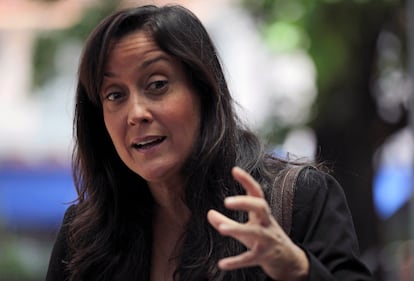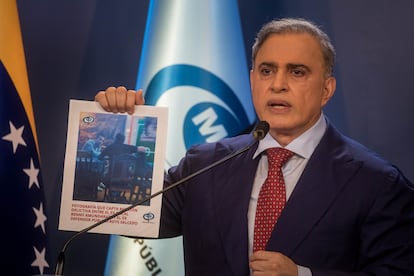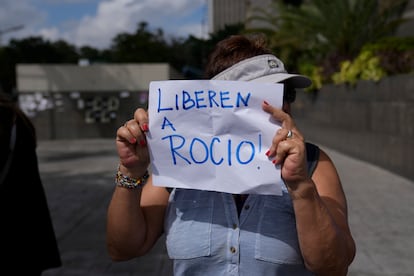Venezuela threatens to prosecute those who question a coup plot against Nicolás Maduro
Attorney General Tarek William Saab launched an attack against human rights organizations: ‘They are lying, and at the same time they are committing a crime by telling these lies’


Venezuela’s Attorney General, Tarek William Saab, on Wednesday rebuked human rights organizations that denounced the arrest of activist Rocío San Miguel. He called the lawyer’s defenders mythomaniacs and crooked, and warned that questioning a coup plot against President Nicolás Maduro may constitute a crime. Saab asserted that last January — when he denounced five alleged plots to assassinate Maduro and other members of the Chavista hierarchy on television — he had already warned that journalists and lawyers were involved in one of the conspiracies, which the authorities have dubbed the White Armband. In his opinion, the existence of an arrest warrant was public knowledge, and that one of the names on the warrant was that of San Miguel, as confirmed last Sunday in a message on social media, 48 hours after the activist was detained at the Maiquetia International Airport and her relatives and lawyers said they were unable to contact her.
“Within the corresponding legal lapses and in strict adherence to the respect of human rights and constitutional guarantees, the presentation hearing was held prior to an arrest warrant,” Saab said in a press conference, during which he did not accept questions from the journalists present. “How do you explain that until now there are people talking about a forced disappearance? Everything is to muddy Venezuelan democracy. They are lying, and at the same time they are committing a crime by telling these lies,” he added when questioning the complaints of more than 200 non-governmental organizations.

The prosecutor gave an outline of the White Armband plot, in which the only evidence presented to date is an edited video of the statement given by former military officer Ángelo Heredia, who was arrested last December. In the recording he mentions a series of people who were prepared to join a conspiracy that began with the seizure of a military weapons depot used by an army battalion in the border state of Táchira, in the western part of the country, and that would continue with the alleged assassination of the governor of that region, Freddy Bernal. This uprising allegedly intended to reach Caracas to make an attempt against the life of the Venezuelan president.
Saab stated that in an “operational order” — which he declined to show — San Miguel is mentioned and added that his role was to “communicate in real time the terrorist actions,” allegedly supported by journalists. Arrest warrants were also issued for journalist Sabastiana Barráez, specialized in military information, and the lawyer and human rights defender Tamara Sujú, both in exile. In his statement, the former military officer allegedly involved in the conspiracy indicates that an “opposition leader” would join the plot with a “statement,” but that identity was suppressed in Saab’s press conference. People close to María Corina Machado, the main opposition candidate disqualified by the Government, were arrested in January as part of these alleged conspiracies.
According to the version given by the attorney general’s office, which is under Maduro’s control, in the review of San Miguel’s telephone conversations after her arrest, “extremely delicate things” were seen that link her to an alleged campaign against the Venezuelan Armed Forces. “She recognizes her role as a conspirator, painting the Armed Forces in a bad light in Europe and the U.S.,” affirmed the prosecutor. There have been 19 arrests of people allegedly involved in the plot and 15 warrants are still pending, according to the authorities.

On Wednesday afternoon, the police raided San Miguel’s house in Caracas, where her daughter, who was also arrested and later released on bail, was being held. The activist was charged with the crimes of treason, conspiracy, criminal association, and terrorism in a hearing held in the early hours of the morning, outside the 48-hour period established by law to charge a detainee and at a police precinct and not in the courts where the case is being heard. She was also not allowed access to her lawyers and has been kept incommunicado from her relatives. Her whereabouts only became known when the judge ordered her place of confinement. These are the allegations of due process violations made by San Miguel’s lawyers and human rights organizations who on Wednesday, while the prosecutor was testifying, met at the U.N. Office of the High Commissioner for Human Rights (OHCHR), which was installed in Caracas in 2019.
The case has allowed activists to shed light on a pattern of forced disappearances in Venezuela which, as established by the United Nations, include those of short duration. “States have an obligation to disclose the whereabouts of persons deprived of their liberty; to hold them in officially recognized places of detention; and to provide information about their detention, promptly and accurately, to their family, their lawyers, or other persons with a legitimate interest,” says the body in a communiqué that brings together the views of experts released in 2016.
In the reports of the International Fact-Finding Mission, which the Venezuelan government has rejected, this practice is recorded in other cases, as is the detention of relatives of the person singled out to exert pressure or force a guilty plea. “This is part of a pattern that has been carried out in Venezuela, extending the persecution to the family group. This is a form of torture, a mechanism to break those who are deprived of their freedom, to subject them to incriminate themselves in that human need to protect their family environment,” said Martha Tineo, coordinator of Justice, Encounter and Forgiveness, during a demonstration in front of the OHCHR. Saab pointed out that San Miguel’s daughter, Miranda Díaz San Miguel, her ex-partner Víctor Díaz Paruta, and her brothers Alberto and Miguel San Miguel were released with conditional liberties for allegedly having obstructed justice, although he did not specify the charges against them.
Sign up for our weekly newsletter to get more English-language news coverage from EL PAÍS USA Edition
Tu suscripción se está usando en otro dispositivo
¿Quieres añadir otro usuario a tu suscripción?
Si continúas leyendo en este dispositivo, no se podrá leer en el otro.
FlechaTu suscripción se está usando en otro dispositivo y solo puedes acceder a EL PAÍS desde un dispositivo a la vez.
Si quieres compartir tu cuenta, cambia tu suscripción a la modalidad Premium, así podrás añadir otro usuario. Cada uno accederá con su propia cuenta de email, lo que os permitirá personalizar vuestra experiencia en EL PAÍS.
¿Tienes una suscripción de empresa? Accede aquí para contratar más cuentas.
En el caso de no saber quién está usando tu cuenta, te recomendamos cambiar tu contraseña aquí.
Si decides continuar compartiendo tu cuenta, este mensaje se mostrará en tu dispositivo y en el de la otra persona que está usando tu cuenta de forma indefinida, afectando a tu experiencia de lectura. Puedes consultar aquí los términos y condiciones de la suscripción digital.








































